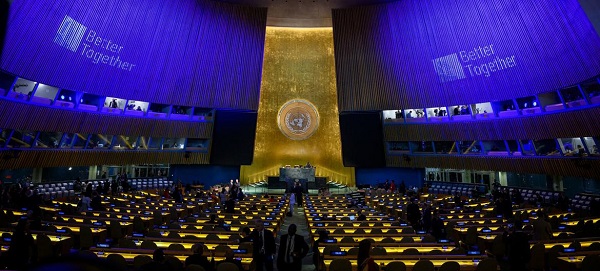On 22 September 2025, as part of his working visit to the United States of America, President Serdar Berdimuhamedov of Turkmenistan took part in the High-level Meeting to Commemorate the 80th Anniversary of the United Nations.
The event began with a musical performance by the youth choir Sing for Hope, singers from the Metropolitan Opera Choir, and pianist David Watkins, conducted by Tillman Michael.
UN General Assembly President Annalena Baerbock, speaking at the event, recalled the dire circumstances under which the Organization was created following two world wars. According to her, the signing of the UN Charter on 26 June 1945, was not merely a formality but a confirmation that humanity had learned lessons from the darkest pages of history.
UN Secretary-General António Guterres also addressed the session, urging participants to remember the Organization’s first employees, many of whom bore “visible wounds from war.”
” They had seen the worst of humanity — the horrors of the death camps, the cruelty of combat, cities entirely wiped out. And it was precisely because of what they had witnessed that they chose to serve peace,” he continued. Contrary to the misconception of naivety in the pursuit of peace, “they knew: Peace is the most courageous, the most practical, the most necessary pursuit of all.”
The Secretary-General reminded the audience that the principles of the UN are facing unprecedented tests today: civilians are under attack, international law is being trampled, the scale of poverty and hunger is growing, and climate chaos is bringing natural disasters.
“To meet these challenges, we must not only defend the United Nations, we must strengthen it,” the UN head declared.
2021 Nobel Peace Prize laureate Maria Ressa noted that humanity is currently experiencing an “information Armageddon,” where lies spread faster than facts, and algorithms are designed to provoke “outrage instead of empathy” and fuel “fear, anger, and hatred, overwhelming us with a toxic stream of information.” According to studies, misinformation spreads six times faster than facts, and the development of generative AI is only exacerbating the situation, Ressa warned.
She proposed three solutions: end the impunity of digital giants and introduce international standards to protect the information environment; build an alternative infrastructure of trust based on independent journalism; and invest in comprehensive initiatives, including strengthening democratic institutions and supporting women’s efforts, who play a key role in peacebuilding.
Nobel Peace Prize laureate and former President of Liberia Ellen Johnson Sirleaf, as well as former Prime Minister of Norway Gro Harlem Brundtland, also shared their visions of the UN’s role during the session.
The meeting concluded with a poetic recitation by global peace advocate Mariam Bukar Hassan.
This week, world leaders – approximately 150 heads of state and government – are gathering at UN Headquarters in New York to discuss pressing global issues such as wars, poverty, and climate change, as part of High-Level Week at the 80th session of the UN General Assembly.

